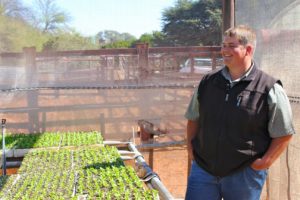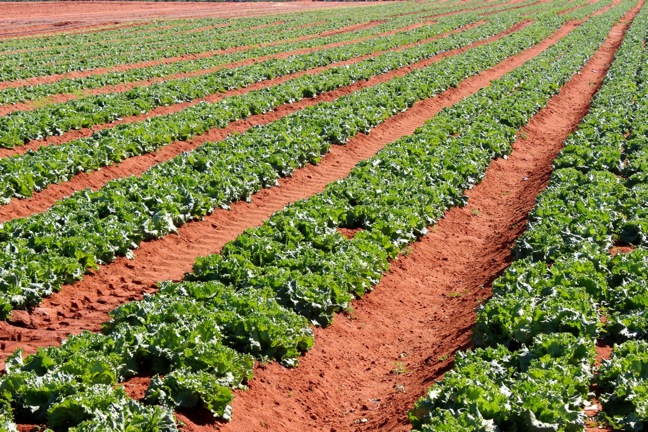Greetings from Namibia! Traveling through another country has been an amazing experience. My eyes have been opened to a new way of life. As we travel through southern Namibia, one thing is becoming clear: A Namibian’s livelihood is heavily dependent on agriculture.
The two forms of farming in Namibia are communal and commercial farming. In Namibia, 41% of the land is considered communal farming areas, while 44% of Namibia is commercial farmland. The other 15% is allocated as conservation areas. Even though there is a greater percentage of farmland utilized by commercial farming, the majority of the Namibian population actually participates in communal farming.
While it is very interesting to talk about communal farming, there is still much to be said about commercial farming. Making a living off the land, whether in the U.S. or in Namibia, is a difficult occupation. Some people who have a limited understanding of agriculture might assume that farming is as simple as planting and watering the ground. However, there are many other factors that one must consider when it comes to farming for profit.
Take into consideration cost of fuel, labor, and fertilizer in the U.S. Now, take those few factors into account, except, within the Namibian environment. Imagine the difficulty a U.S. farmer faces when he has a dry season. Now, consider that the average annual rainfall in Namibia is 270mm. All farmers face the same challenges, however, not all farmers have access to the same resources to overcome those challenges. Namibian farmers are forced to make the most out of their limited resources.
One man who has learned to do just that is Jimmy Kennedy of Patria Farms (pictured above). Jimmy is a commercial farmer in the town of Stampriet. For the Kennedys, farming is a family affair, as they pass the responsibilities down from one generation to the next. We had the pleasure of meeting Jimmy, who was kind enough to show us how his family’s farm operates on an average day. Touring was quite an experience since we were the first group of people to ever tour and inquire about Patria Farms.
Patria Farms provides fresh produce for small markets in Stampriet, as well as for some of the main grocery stores in Windhoek. Patria Farms is also a seed stock producer for some of the surrounding farms as well. Some of their growing practices are similar to what you might see in the U.S. They utilize crop rotation patterns to promote healthy soil. They have a drip irrigation system that delivers fertilizer to their crops. Having a system such as this is very innovative compared to other farms in the Stampriet area.
Some of the challenges that Patria Farms faces are not your average challenges. For example, there is a huge concern when it comes to game disturbing the crops. In order to remedy this problem, they are forced to spend a lot of time and resources on specialized fences that keep game from destroying their crops.
Another problem they face, that Texans certainly never have to face, is the problem with trespassers and thieves. If someone steals crops or livestock from Patria Farms, the only action they can legally take is to contact the authorities. Because the Namibian judicial system is so backed up that the offenders, if caught, will not have a trial for the next several years. The inefficient judicial system allows offenders to be released, giving them the opportunity to continue their theft.
Additionally, Namibia has an entirely different type of soil than what we see in the U.S. In Namibia, 97% of soil is less than 5% clay content (See picture below). Having soil without very much clay prohibits water retention, thus making the process of watering crops a huge challenge. The soil makeup coupled with the limited rainfall creates a tremendous hurtle for farmers like Jimmy.
This may seem mundane to individuals who lack an agricultural background. However, when taking a deeper look at farmers like Jimmy, one starts to appreciate a family of farmers who are only as profitable as their crops. Patria Farms lives and breathes agriculture and the operators have high character when it comes to work ethic. The Kennedy’s are a shining example of commercial farming at its best.

